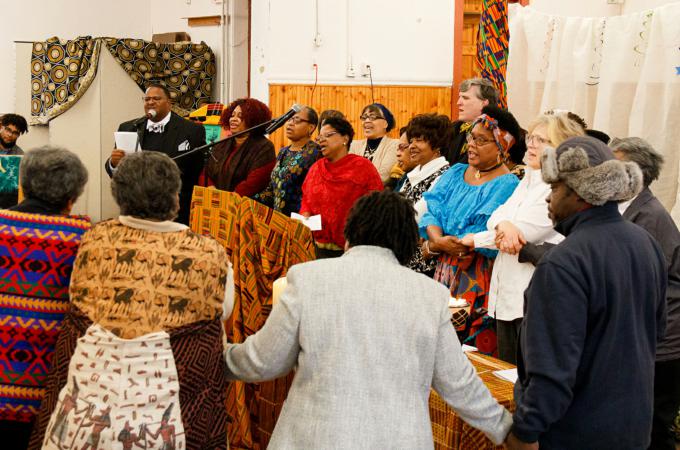Memory of Martin Luther King honored at prayer breakfast
DORCHESTER -- Despite temperatures in the single digits and icy terrain, about 100 people came to St. Katharine Drexel Parish for the 34th annual Rev. Dr. Martin Luther King, Jr. Prayer Breakfast on Jan. 21.
"Usually, there are about 180-200 people in attendance. These brave souls came out to celebrate despite the great freeze," Black Catholic Ministries Coordinator Lorna DesRoses said in an email to the Pilot.
Father J. Bryan Hehir attended the breakfast on behalf of Cardinal Seán O'Malley, who was in Panama for World Youth Day. Speaking to the attendees, he said a highlight of the U.S. Conference of Catholic Bishops meeting in November was when the bishops published a pastoral letter against racism.
"We need to remember that, because it was a document that has not yet received the attention it should have," he said.
Father Hehir said one way to think about Dr. King is to think of the cities associated with him, including Atlanta, Birmingham, Memphis, and Boston. Dr. King attended Boston University and returned in 1965, when Father Hehir was a seminarian.
"We are the inheritors of what he left us," Father Hehir said.
Rev. Dr. Martin Luther King, Jr. would have been 90 years old on his birthday, Jan. 15. The national holiday in his honor is held on the third Monday of January.
The prayer breakfast usually includes a reading from one of Dr. King's speeches. This year, St. Katherine Drexel parishioner Maria Grace read an excerpt from a speech delivered by Dr. King's wife, Coretta Scott King, to Harvard University students in 1968.
Dr. King had accepted an invitation to speak there but was assassinated in April of that year, so Mrs. King came in his place. In her speech, entitled "We May Yet Not Only Survive, We May Triumph," she spoke of problems relating to poverty and commended the power and vitality of the emerging student movement.
The parish's music director Meyer Chambers led the Boston Black Catholic Choir in songs throughout the event, which ended with everyone in attendance singing "We Shall Overcome."
The featured speaker at the breakfast was journalist Byron Barnett, reporter for WHDH 7News and host of the public affairs show "Urban Update."
Barnett said this was his second time giving a public address about Dr. King. The first time was in 1969, a year after Dr. King's assassination, when Barnett was in middle school. Even then, he said, he understood the gravity of the subject. Barnett recalled that on the day of Dr. King's assassination, Barnett's mother, who had never taken a sick day, came home in the middle of her shift because she was too upset to work.
"It was very upsetting to see my mother like that. It also clarified for me what a tragic and significant loss Dr. King's death was to our country," Barnett said.
He acknowledged that Dr. King inspired many white people to join the effort to help black people in their struggle for civil rights, even to the point of risking, and sometimes giving, their lives. One of those was James Reeb, a white minister from Boston who was killed after participating in a march led by Dr. King in Selma, Alabama, in 1965.
Barnett said that the civil rights movement did not end with the abolition of Jim Crow laws, but rather entered a new phase. At the same time, and over the subsequent decades, new technology changed news media.
In the 1960s, he said, Americans got their news from three major television networks, which all portrayed events from the perspective of older white male journalists. Changes in news technology, Barnett said, changed the way Americans shared and processed news. Today, many only watch media that reinforce beliefs they already hold. Barnett believes this is why political discourse is so divided today.
"To me it often seems that we are no longer talking to each other or even at each other but past each other. Do you think Dr. King could have bridged that gap today?" Barnett said.
He encouraged the breakfast attendees to do two things. The first was to read about the history of people of color in the United States.
"When you read black history, you begin to realize this really isn't black history, this is American history," Barnett said.
His second recommendation was to become involved in politics. Barnett encouraged everyone to vote, teach children about voting, encourage friends to vote, and get involved in campaigns.
The parish presented Barnett with a Drum Major for Justice Award, in recognition of excellence in journalism.
"Each year, St. Katharine Drexel Parish and Black Catholic Ministries presents an award to the guest speaker to show appreciation for their accomplishments and to thank them for sharing his (or) her reflections on how Rev. Dr. King has affected their lives. So you see, each year, the award has a bit of a different flavor," DesRoses told the Pilot.



















